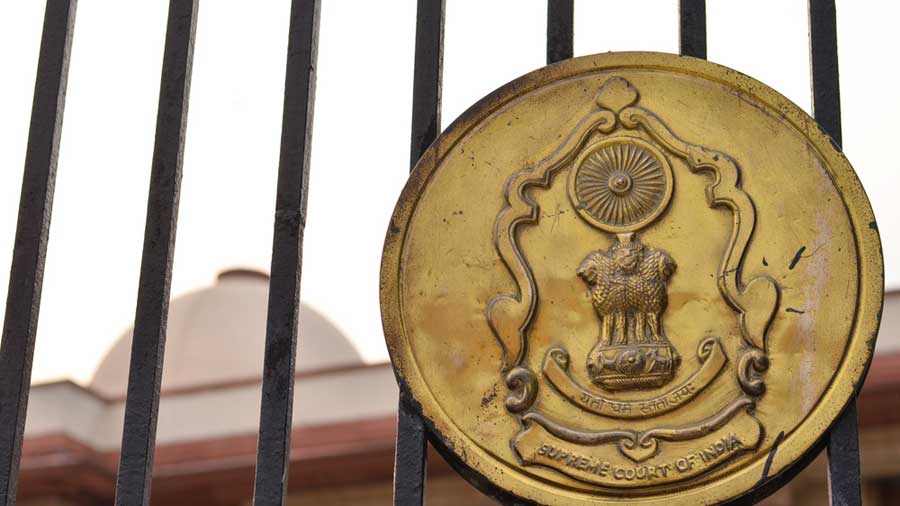The Supreme Court has set up a 12-member national task force of doctors and bureaucrats to primarily formulate a methodology for the scientific allocation of oxygen to mitigate the extreme shortage in many parts of the country because of the sharp rise in Covid cases.
A bench of Justices D.Y. Chandrachud and M.R. Shah, which had passed the order on May 6, formally uploaded the written order on Saturday night.
The members are Dr Bhabatosh Biswas, former vice-chancellor of the West Bengal University of Health Sciences, Calcutta; Dr Devender Singh Rana, chairperson of the board of management of Sir Ganga Ram Hospital, Delhi; Dr Devi Prasad Shetty, chairperson and executive director of Narayana Healthcare, Bangalore; Dr Gagandeep Kang, professor at Christian Medical College, Vellore; Dr J.V. Peter, director of Christian Medical College, Vellore; Dr Naresh Trehan, chairperson and managing director of Medanta Hospital and Heart Institute, Gurgaon; Dr Rahul Pandit, director of critical care medicine and ICU at Fortis Hospital, Mulund (Mumbai) and Kalyan (Maharashtra); Dr Saumitra Rawat, chairman and head of department of surgical gastroenterology and liver transplant at Sir Ganga Ram Hospital; Dr Shiv Kumar Sarin, senior professor and head of department of hepatology and director at the Institute of Liver and Biliary Sciences, Delhi; Dr Zarir F. Udwadia, consultant chest physician at Hinduja Hospital, Breach Candy Hospital and Parsee General Hospital in Mumbai; secretary, Union ministry of health and family welfare; and the cabinet secretary. The cabinet secretary is the convenor of the task force while the health secretary is an ex-officio member.
The court said the task force would facilitate audits of oxygen generation and distribution, and will constitute sub-groups or committees for each state and Union Territory that will have an official not below the rank of secretary to the state government, an official of the Union government not below the rank of additional or joint secretary, two medical doctors including at least one with administrative experience of managing the medical facilities of a hospital, and a representative from the Petroleum and Explosives Safety Organisation.
The Delhi sub-group has as members Dr Randeep Guleria, professor and head of the department of pulmonary medicine and sleep, AIIMS; Dr Sandeep Budhiraja, clinical director and director of internal medicine at Max Healthcare; and an IAS officer each from the central and the Delhi governments.
The terms of reference of the national task force shall be to:
* Assess and make recommendations for the entire country based on the need for and availability and distribution of medical oxygen.
* Formulate and devise the methodology for the allocation of medical oxygen to the states and Union Territories on a scientific, rational and equitable basis.
* Make recommendations on augmenting the available supplies of oxygen based on present and projected demands likely during the pandemic.
* Make recommendations for the periodical review and revision of allocations based on the stage and impact of the pandemic.
* Facilitate audits by sub-groups to determine whether the supplies allocated by the Centre reach the concerned state or Union Territory, to monitor the efficacy of the distribution networks meant for hospitals, healthcare institutions and others, whether the available stocks are being distributed on the basis of an effective, transparent and professional mechanism, and to fix accountability with regard to the utilisation of the supplies of oxygen.
* Review and suggest measures necessary for ensuring the availability of essential drugs and medicines.
* Plan and adopt remedial measures for ensuring preparedness to meet present and future emergencies.
* Facilitate the use of technology to ensure that the available manpower is optimised for implementing innovative solutions, particularly in order to provide an outreach of expert medical care to rural areas.
* Suggest measures to augment the availability of trained doctors, nurses and paramedical staff, including through the creation of suitable incentives.
* Promote evidence-based research to enhance effective responses to the pandemic.
* Facilitate the sharing of best practices across the nation to promote knowledge about the management of the pandemic and treatment.
* Make recommendations on other issues of pressing national concern to find effective responses to the pandemic.
The court said the cabinet secretary may nominate an officer not below the rank of additional secretary to depute for him when necessary.
The task force is at liberty to draw upon the human resources of the Centre for consultation and information. Such personnel will include a member of the Niti Aayog to be nominated by the vice-chairperson; secretary, ministry of home affairs; secretary, department for promotion of industry and internal trade; secretary, ministry of road transport and highways; director, AIIMS, New Delhi; director-general, Indian Council of Medical Research, New Delhi; director-general of health services; director-general, National Informatics Centre; and head, Centre for Development of Advanced Computing.
The task force will be able to co-opt or seek the assistance of other experts within or outside the government for infectious disease modelling, critical care, clinical virology/immunology and epidemiology/public health.
The Centre, state governments, ministries, agencies and departments shall provide complete and real-time data to facilitate the work of the task force. All private hospitals and other healthcare institutions will have to cooperate with the task force.
“The rationale for constituting a task force at the national level is to facilitate a public health response to the pandemic based on scientific and specialised domain knowledge. We expect that the leading experts in the country shall associate with the work of the task force both as members and resource persons,” the Supreme Court said.
“This will facilitate a meeting of minds and the formulation of scientific strategies to deal with an unprecedented human crisis. The establishment of this task force will enable the decision-makers to have inputs that go beyond finding ad-hoc solutions to the problems. The likely future course of the pandemic must be taken into contemplation at the present time,” the bench added.










